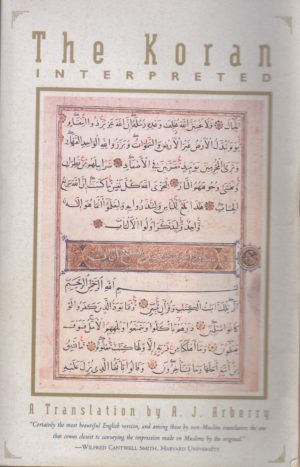
The Koran Interpreted (translated by A. J. Arberry) (1996. Touchstone. ISBN 9780684825076)
As with my reading of The Book of Mormon, this is a review of the literary merit of one of mankind’s most beloved scriptural texts, The Koran. It is not my attempt to critique or disassemble the theology of Islam: I will leave that to the scholars. I am just an average, ordinary American, raised Christian amongst other Christians and a smattering of Jews and nonbelievers, who is trying to understand the basic tenets of a faith that underpins many of the lives, cultures, and social orders of the latest immigrants to the United States. So take what I observe and write here in the spirit in which it is written: as a critic of the language, writing, and structure of The Koran, not as a criticism of The Book’s core beliefs.
First, the repetition. Gehenna, a Biblical valley that appears in Hebrew scripture, is referenced, by one account, more than 70 times in The Koran. I gave up counting how many times the terms “chastisement” (as in “the unbelievers will suffer a great chastisement”) and “punishment” appear within the suras (chapters) of the book. This constant refrain of salvation and damnation, the repetitiveness of the text, may well, when read aloud in a mosque or recited by heart at prayer, reinforce the central themes of the second largest religion in the world. (One source has Christianity as the largest at 33% with Islam second at 21% of the world’s population; USA Today predicts that by 2070, Islam will supplant Christianity as the world’s largest faith community.) But when read as a complete text, from beginning to end, this consistency becomes redundant. I found this repetitiveness reminiscent of the overly repeated refrains found in The Book of Mormon, though, to be fair, The Messenger’s collection of revelations and scripture precedes Joseph Smith’s discovery by 1,200 years, making The Koran a likely source of inspiration for the Mormon prophet’s revelations. One thing that sets The Koran apart from Smith’s retelling of the contents of the golden plates is the language. Whereas Smith, an uneducated and illiterate religious searcher, relied upon a tone and tenor that was pedestrian and ordinary in its prose, The Messenger’s presentation of the Eternal Book is, despite also coming from an oral tradition, far more polished and, in some suras, reaches the poetry of The Bible:
Hast thou seen him who lies to the Doom? That is he who repulses the orphan and urges not the feeding of the needy. So woe to those that pray and are heedless of their prayers, to those who make display and refuse charity.
(Sura CVII)
This is not an easy text to read. And I am certain that if I was privileged to hear the verses and suras recited in their original Arabic, there would be a flow, a magic to the words that transcends even the best English translation of this compilation of revelations from the Divine. But even in English, The Book displays moments of linguistic clarity and beauty; and, departing from my initial premise (that I would not delve into theology) much of what radical Islam is preaching and acting upon (jihad being raised against children, women, the old, and the infirm in the name of God) is nowhere to be found in this book. Certainly, just as with Judaism and Christianity, there are facets of a faith that come from customs and practices created over millennia of observance, some of which may support suicide bombings, kidnappings, beheadings, and the murder of noncombatants or captured combatants. But I did not, in my time with The Koran, find those practices ingrained in the spiritual message of this book. As a Christian, I may be troubled that The Messenger defines Christ not as God embodied on Earth, but as a mortal prophet akin to Moses and Noah. In addition, there is a theme of evangelism to the text; the need to convert unbelievers to The Book that mirrors Paul’s exhortations to conversion in the New Testament. But The Koran incorporates both Jews and Christians into a larger, monotheistic framework of faith, considering those religious bodies to also be People of the Book. Perhaps the world would be a better, calmer place if Jews and Christians extended the same courtesy to Muslims.
Reading The Koran was not easy but it was enlightening and, given the world we live in, essential for non-Muslims to at least attempt.
4 stars out of 5. The book is, as indicated, rated for literary merit, not its spiritual content.
Peace.
Mark


